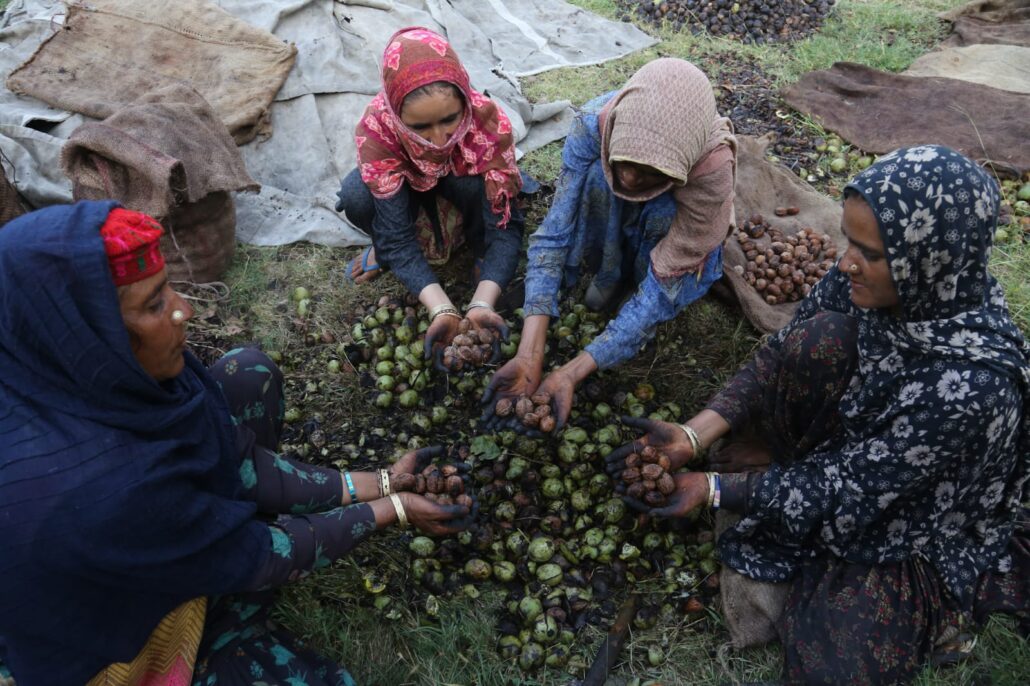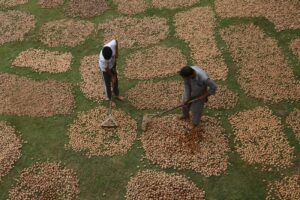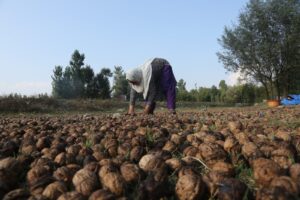
Hashim Zakir
Ghulam Rasool in his late 40s has been cultivating walnuts in his ancestral land for the last 20 years. His whole family depends on walnut production. “When I started, the rates and demand for the crop were high but in the last two decades a lot of people shifted towards this crop and then the lack of an international market and a Walnut Mandi led to the downfall of the walnut industry,” Ghulam Rasool stated.
As walnut covers over 85.05% of the total land used for dry fruit cultivation in Kashmir, A study conducted in 2004 stated that over 40000 people are directly dependent on the crop. The number of families dependent on the crop increased over the last two decades as the area over cultivation also expanded. While as, in recent years walnut cultivation has seen a drastic change, with different farmers claiming different reasons for its downfall.
“It takes a lot of hard work to make walnuts market ready, but we don’t get enough money out of this. ‘Cheap’ imported varieties, especially from California and other parts of the world, and the lack of Government and scientific intervention hit this industry badly. If the government doesn’t intervene I am thinking of shifting to an apple plantation to earn a livelihood.” Said Irfan, a farmer from central Kashmir’s Budgam district.

The number of walnuts exported from Kashmir in the year 2021-22, was 2.67 lakh metric tons. In 2020-21, 2.58 lakh were exported, 2.26 in 2019-20, 2.78 in 2018-19 and 2.75 in 2017-18.
India ranks eighth among the walnut-producing countries of the world. 90% of the total production comes from Kashmir which is around 2.75 lakh metric tons. 89000 hectares of land are used for walnut cultivation in the valley.
A research paper submitted by Dr. Mohammad Taufique and Vajahat Khursheed stated that “Kashmir’s economy has an important contribution from walnut industry and its already losing ground in the valley where from the maximum production of the country comes. In recent years some of the major districts of the state have recorded negative growth and the list includes Srinagar followed by Rajouri, Budgam, Bandipora, Shopian, and Kathua. Besides this, the cash earned from walnuts and export reduction is also on the negative side. With all this research we can conclude that this dry fruit industry is at a loss. It also stated that “The walnut industry is confronted with a wide range of challenges. The reasons for the pathetic stage of this cash industry include the issues like ruthless chopping of trees, poor infrastructure, transportation bottlenecks, lack of effective export and marketing strategies, etc.”
Some of the growers also claim that climate change is one of the major issues which hit production. According to growers the decrease in the market started four years back, especially after the BJP-led central government abrogated Article 370, the region’s special status, on August 5 resulting in a months-long lockdown and shutdown. Covid-19 lockdown also helped the downfall, claimed some of the growers.
“After the Government levied 5% of Goods and Services Tax (GST) on walnut products, its impact came directly on us. The Government pays no attention to walnut farming. Locally we don’t have a walnut Mandi in Kashmir. Kashmiri walnuts should be given access to the international market. A Mandi should also be established,” Said Ghulam Rasool.
A report submitted in 2018 by the International Journal of African and Asian Studies titled ‘A case of Almond and Walnut Cultivation in Jammu Kashmir’ in its conclusion states that, “Walnut sector has a great potential for the employment generation for the youth as it’s an important part of the economy. It can become a full-fledged industry only if the government encourages and intervenes the fruit cultivation.” It further added that “The government should focus on providing the sector-related infrastructural facilities for the growth and development of this industry.”

“Due to the lack of a local Mandi we have to go to Jammu and it increases the cost. If a Mandi specifically for walnuts is set up here, we will save more money. A lot of people including, labourers, farmers, and traders survive on this industry. The government should come forward with a helping hand towards the growers. They should work on effective solutions so that the rates of walnuts will increase and this dying industry will survive,” requested Irfan
